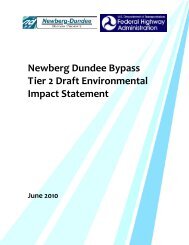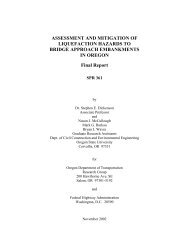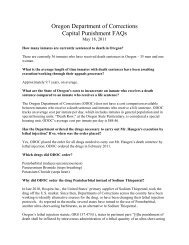Oregon Balance of State HIV/AIDS Housing & Services Systems ...
Oregon Balance of State HIV/AIDS Housing & Services Systems ...
Oregon Balance of State HIV/AIDS Housing & Services Systems ...
You also want an ePaper? Increase the reach of your titles
YUMPU automatically turns print PDFs into web optimized ePapers that Google loves.
<strong>Oregon</strong> <strong>HIV</strong>/<strong>AIDS</strong> <strong>Housing</strong> and <strong>Services</strong> <strong>Systems</strong> Integration Plan 45<br />
care. But the OHBHI award will not eliminate the gap, and applies only to clients in the I-5<br />
corridor.<br />
10. Limited Access by People Living with <strong>HIV</strong>/<strong>AIDS</strong> to Mainstream Behavioral Health<br />
<strong>Services</strong><br />
Steering Committee members noted the availability <strong>of</strong> limited statewide housing development funds<br />
to serve people with behavioral health issues and unmet housing needs: Community Mental Health<br />
<strong>Housing</strong>, Alcohol and Drug Free <strong>Housing</strong>, and the new Expanding Community Living<br />
Opportunities fund. Demand for these funds exceeds availability, and to date they have not<br />
supported developments with units dedicated to people living with <strong>HIV</strong>/<strong>AIDS</strong>.<br />
On an individual client level, OHOP housing coordinators and partners have also had trouble<br />
accessing the network <strong>of</strong> mental illness respite beds across the state. Qualification criteria can be<br />
strict, and there are limited points <strong>of</strong> referral such as mental health departments.<br />
Human <strong>Services</strong> and Public Assistance<br />
Many people living with <strong>HIV</strong>/<strong>AIDS</strong> in <strong>Oregon</strong> have an array <strong>of</strong> basic needs that are common to<br />
low-income people in general. These can include family support, transportation, food and<br />
nutritional assistance, hygiene, and general financial needs. Awareness and understanding <strong>of</strong> the<br />
service needs <strong>of</strong> people living with <strong>HIV</strong>/<strong>AIDS</strong> tend to be limited among the many government and<br />
nonpr<strong>of</strong>it agencies that provide general human services throughout the balance <strong>of</strong> state. Stigma<br />
based on misconceptions and generalizations about <strong>HIV</strong> disease and people who are living with<br />
<strong>HIV</strong>/<strong>AIDS</strong> can be a barrier to fair and compassionate service delivery.<br />
11. Loss and Scarcity <strong>of</strong> Funding for Human <strong>Services</strong><br />
Nationwide, human services tend to be locally funded – and usually underfunded, especially in<br />
smaller, more rural counties. In some areas <strong>of</strong> <strong>Oregon</strong>, the loss <strong>of</strong> timber revenues upon which such<br />
counties have relied for many years has compounded with an aging population and loss <strong>of</strong> young<br />
people to the cities, dealing major blows to the budgets <strong>of</strong> human service agencies. The small<br />
number <strong>of</strong> “one-stop” centers in which multiple agencies coordinate their services to wrap around<br />
client households has dwindled, making the services that remain harder to access.<br />
12. Family Support Needs<br />
OHOP serves a substantial number <strong>of</strong> family households (as compared to individuals); this<br />
proportion varies by region, with more families receiving housing help in Eugene, for example, than<br />
in Salem. Families typically need larger housing units, <strong>of</strong> which the supply may be limited. Also,<br />
different family members may require different kinds <strong>of</strong> services, thereby increasing the number <strong>of</strong><br />
systems with which a household is involved and the complexity <strong>of</strong> meeting their needs. Some types<br />
<strong>of</strong> housing and services options funded for people living with <strong>HIV</strong>/<strong>AIDS</strong> may be more or less<br />
appropriate to family groups.<br />
Criminal Justice<br />
A large percentage <strong>of</strong> new <strong>HIV</strong> diagnoses in <strong>Oregon</strong> are among people who have served time in<br />
jails or prisons. Research also shows that people with histories <strong>of</strong> incarceration are much more<br />
likely to have <strong>HIV</strong>/<strong>AIDS</strong> than the general population. Members <strong>of</strong> the Steering Committee lauded<br />
the <strong>Oregon</strong> <strong>State</strong>wide Supportive Community Reentry (OSSCR) funding, a HOPWA competitive

















